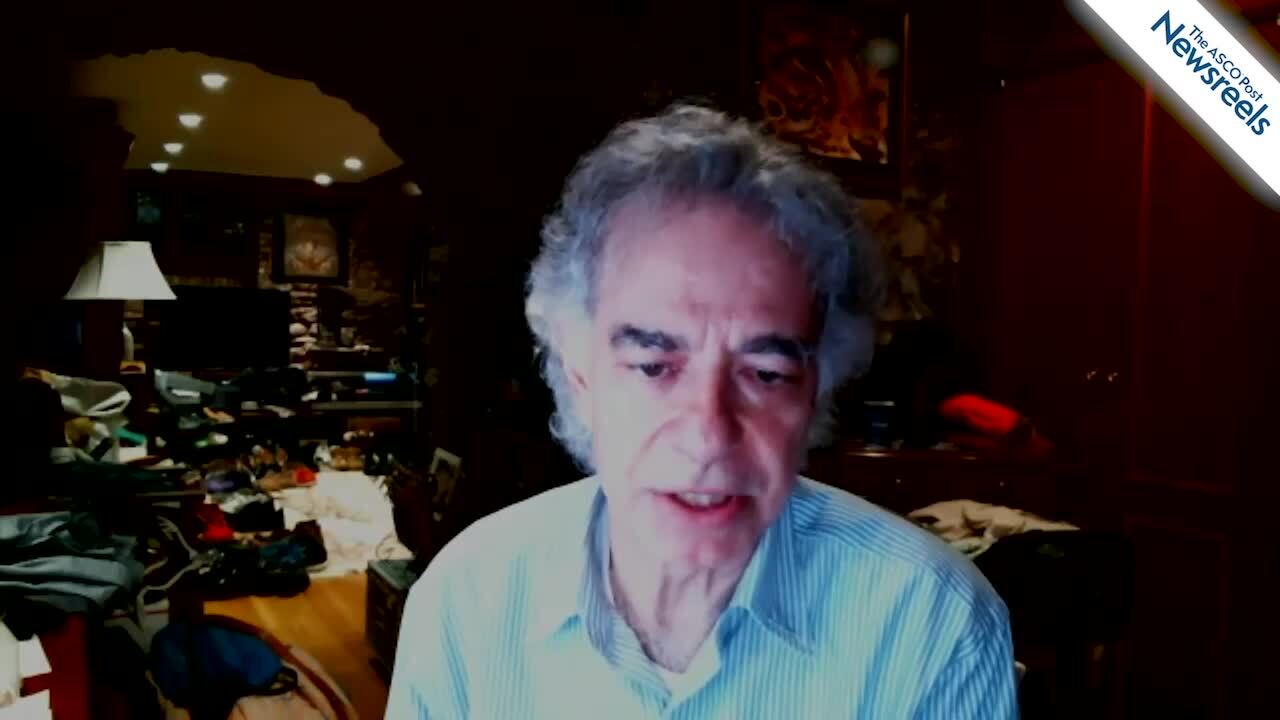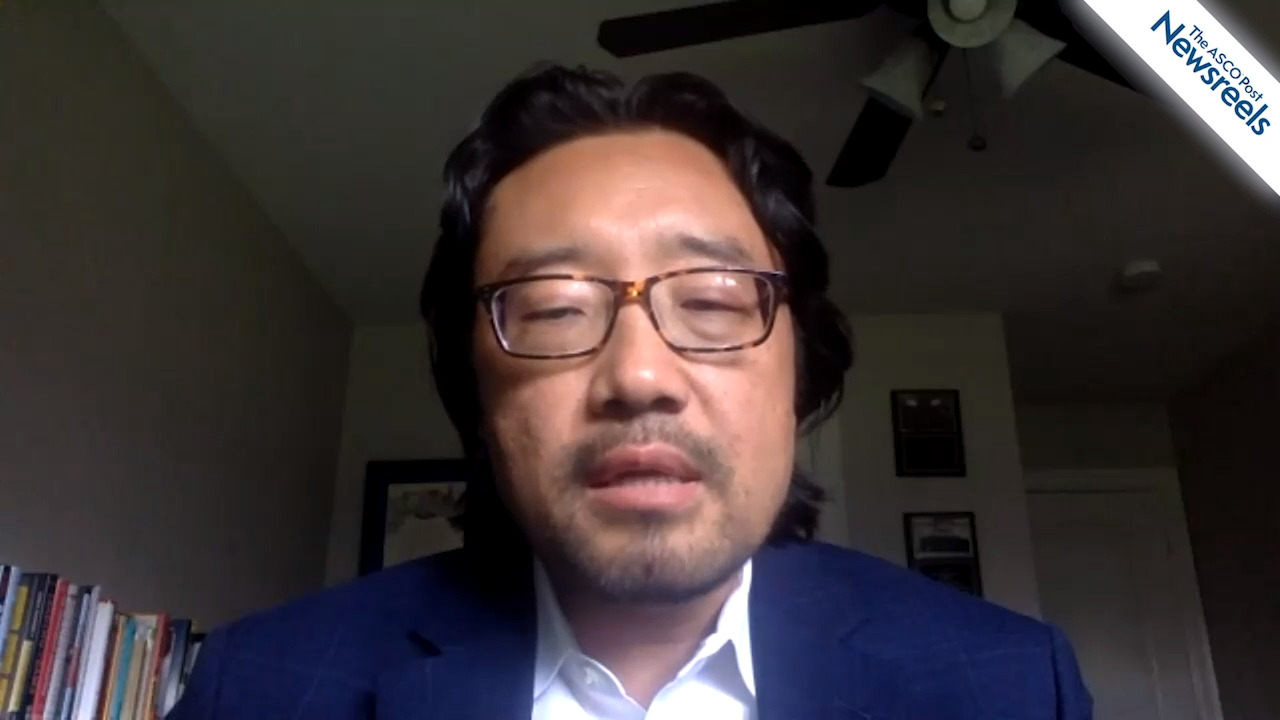First-Line Lorlatinib vs Crizotinib in Advanced ALK-Positive NSCLC
As reported in The New England Journal of Medicine by Alice T. Shaw, MD, PhD, and colleagues, an interim analysis of the phase III CROWN trial has shown that first-line lorlatinib significantly improved progression-free survival and intracranial response rate vs crizotinib in patients with advanced ...
State of Lung Cancer Report Finds People of Color Face Greater Burden, Worse Lung Cancer Outcomes in the United States
People of color diagnosed with lung cancer face worse outcomes compared to White Americans, according to the American Lung Association’s third annual State of Lung Cancer report. The 2020 State of Lung Cancer report tracks the toll of lung cancer by state, and for the first time, this year’s report ...
Study Finds the Lung Microbiome May Affect Tumor Progression and Prognosis in Patients With Lung Cancer
A new study by Tsay et al sheds light on the role the lung microbiome may play in lung cancer pathogenesis and prognosis. According to the study’s findings, enrichment of the lungs with oral commensal microbes was associated with advanced-stage disease, worse prognosis, and tumor progression....
Adjuvant Irinotecan/Cisplatin vs Etoposide/Cisplatin for Resected High-Grade Neuroendocrine Carcinoma of the Lung
In a Japanese phase III trial reported in the Journal of Clinical Oncology, Kenmotsu et al found that adjuvant irinotecan/cisplatin did not improve relapse-free survival vs etoposide/cisplatin in patients with completely resected, pathologic stage I–IIIA, high-grade neuroendocrine carcinoma of the...
Mary Pasquinelli, DNP, APRN, FNP-BC, on Addressing Lung Cancer Care Equity in Vulnerable Communities
Mary Pasquinelli, DNP, APRN, FNP-BC, of the University of Illinois Hospital and Health Science System, discusses proposed U.S. Preventive Services Task Force lung cancer screening guidelines, which show race and gender disparities, and how modifying these recommendations with a risk prediction model may improve health care.
Study Finds State-Level Lung Cancer Screening Rates Not Aligned With Lung Cancer Burden in the United States
A new study published by Stacey A. Fedewa, PhD, and colleagues in JNCI: Journal of the National Cancer Institute found that state-level lung cancer screening rates were not aligned with the national lung cancer burden. The report provides the first population-based state-level screening data for...
James L. Mulshine, MD, on Meeting Highlights: Advancing Quantitative Low-Dose CT Imaging in Thoracic Disease
James L. Mulshine, MD, of Rush University Medical Center, offers an overview of the 2020 Quantitative Imaging Workshop, whose mission is to leverage the use of CT to speed early detection and improve the management of lung cancer and other thoracic diseases.
Medicaid Expansion Associated With Decreased Mortality in Patients With Newly Diagnosed Breast, Colorectal, and Lung Cancers
In states that have expanded Medicaid availability as part of the Affordable Care Act (ACA), mortality rates for three major types of cancer are significantly lower than in states that have not expanded their Medicaid, according to findings from a new study published by Miranda B. Lam, MD, MBA, and ...
Combination of Nivolumab and Ipilimumab for Unresectable Malignant Pleural Mesothelioma
On October 2, 2020, the combination of nivolumab (Opdivo) plus ipilimumab (Yervoy) was approved for first-line treatment of adult patients with unresectable malignant pleural mesothelioma.1-3 Supporting Efficacy Data Approval was based on findings in the open-label phase III CheckMate 743 trial...
Liquid Biopsy: Mounting Evidence Shows Clinical Utility in Tumor Monitoring
A “blood-first” approach could soon shift the diagnostic paradigm in advanced lung cancer, replacing tissue biopsy with minimally invasive assays. According to Natasha B. Leighl, MD, MMSc, FRCPC, FASCO, there is rapidly mounting evidence that liquid biopsy serves a prognostic function in advanced...
Fragment Analysis as a MET Exon 14 Screening Strategy in NSCLC Tumors
Comparison of two techniques used in screening non–small cell lung cancer (NSCLC) tumor samples demonstrated that fragment analysis could detect large MET exon 14 skipping deletions that were missed by next-generation sequencing, according to findings presented at the Molecular Analysis for...
Lung Cancer: Precision Therapies at the Forefront
What a difference 20 years have made! In the year 2000, the results of the ECOG 1594 trial were reported at the plenary session of the ASCO Annual Meeting. The study demonstrated comparable outcomes between four different platinum-based chemotherapy regimens for the treatment of metastatic...
David Yankelevitz, MD, on Early-Stage Lung Cancer: Renewed Interest in Combined-Modality Treatment
David Yankelevitz, MD, of the Icahn School of Medicine at Mount Sinai, discusses the renewed interest in applying adjuvant and neoadjuvant targeted treatments to earlier-stage lung cancer, given the promising results in more advanced disease. The challenges, he says, include identifying patient subgroups with a high likelihood for recurrence and therapeutic toxicities.
FDA Approves Companion Diagnostic for Three Targeted Therapies for Advanced Ovarian, Breast, and Non–Small Cell Lung Cancers
On October 27, 2020, the U.S. Food and Drug Administration (FDA) approved the FoundationOne Liquid CDx test for three new companion diagnostic indications to help match patients who may benefit from treatment with specific FDA-approved targeted therapies. The new indications are for alpelisib...
Fred R. Hirsch, MD, PhD, on Early-Stage Lung Cancer: Targeted Treatment and Screening
Fred R. Hirsch, MD, PhD, of The Tisch Cancer Institute at Mount Sinai, discusses lung cancer screening for aggressive early-stage lung cancer; adjuvant and neoadjuvant treatment, including the ADAURA study of EGFR-positive tumors; and how cell-free DNA analysis might be used in the future to monitor therapy.
Biomarker-Driven Master Protocol to Test Therapies for Previously Treated Patients With Squamous NSCLC
In an article published in The Lancet Oncology, Redman et al described the conduct of and findings from the Lung Cancer Master Protocol (Lung-MAP; SWOG S1400), a completed biomarker-driven master protocol designed to address the need for improved therapies for previously treated patients with...
Daniel G. Petereit, MD, on Disparities in Lung Cancer Care for Northern Plains American Indians
Daniel G. Petereit, MD, of the John T. Vucurevich Cancer Care Institute and Monument Health, discusses the Walking Forward health-care program designed for a South Dakota–based Native American population, whose members have high smoking and death rates from lung cancer as well as limited access to low-dose CT scans.
FDA Pipeline: Priority Reviews in NSCLC, Gastric Cancer
Recently, the U.S. Food and Drug Administration (FDA) granted Priority Review to a PD-1 inhibitor for the treatment of patients with locally advanced or metastatic non–small cell lung cancer (NSCLC), and also granted Priority Review to a HER2-directed antibody-drug conjugate for patients with...
Multisystem Immune-Related Adverse Events and Disease Outcomes Among Patients With NSCLC Treated With Immunotherapy
In a retrospective cohort study reported in JAMA Oncology, Shankar et al found improved progression-free and overall survival among patients who experienced multisystem immune-related adverse events after anti–PD-1 or anti–PD-L1 immune checkpoint inhibitor therapy for stage III/IV non–small cell...
Capmatinib Active in Advanced NSCLC With MET Exon 14 Skipping Mutations
As reported inThe New England Journal of Medicine by Jürgen Wolf, MD, of the Center for Integrated Oncology, University Hospital Cologne and University of Cologne, and colleagues, the phase II GEOMETRY mono-1 trial has shown durable responses with the selective MET inhibitor capmatinib in patients...
EMPOWER-Lung 1 Trial: Cemiplimab Improves Survival Over Chemotherapy in Advanced NSCLC
The European Society for Medical Oncology (ESMO) Virtual Congress 2020 presented several abstracts with good news for patients with lung cancer. Long-term follow-up of immunotherapies showed excellent survival, a promising new ALK inhibitor improved outcomes compared with the standard of care, the...
Lorlatinib Improves Outcomes Over Crizotinib in First-Line Setting of ALK-Positive NSCLC: CROWN Trial
Lorlatinib significantly improved progression-free survival compared with crizotinib in the first-line treatment of patients with advanced ALK-positive non–small cell lung cancer (NSCLC), according to a planned interim analysis of the phase III CROWN trial presented at the European Society for...
FDA Pipeline: Priority Reviews in EGFR-Mutant Lung Cancer, Advanced Renal Cell Carcinoma; Fast Track Designations in CLL and Solid Tumors
Recently, the U.S. Food and Drug Administration (FDA) granted Priority Review to treatments for EGFR-mutant lung cancer and advanced renal cell carcinoma; granted Fast Track designation to agents in chronic lymphocytic leukemia (CLL) and locally advanced or metastatic solid tumors; and more....
Do Patients With Early-Stage NSCLC Have a Higher Tumor Mutational Burden Than Those With More Advanced Disease?
The tumors of patients with stage I and II non–small cell lung cancer (NSCLC) demonstrated a generally higher tumor mutational burden and more often displayed the mutational signature associated with tobacco smoking than those of patients with more advanced disease, according to findings presented...
Fragment Analysis as a MET Exon 14 Screening Strategy in NSCLC Tumors
Comparison of two techniques used in screening non–small cell lung cancer (NSCLC) tumor samples demonstrated that fragment analysis could detect large MET exon 14 skipping deletions that were missed by next-generation sequencing, according to findings presented at the Molecular Analysis for...
Addition of Cetuximab to Afatinib in First-Line Treatment of EGFR-Mutant NSCLC
As reported in the Journal of Clinical Oncology by Sarah B. Goldberg, MD, MPH, and colleagues, final results of the phase II SWOG S1403 trial show no progression-free survival benefit with afatinib plus cetuximab vs afatinib alone in the first-line treatment of EGFR-mutant advanced non–small cell...
Association of Adjuvant Chemotherapy With Survival in Early-Stage NSCLC: Do Tumor Size and High-Risk Features Have an Impact?
In a retrospective cohort study reported in JAMA Oncology, Pathak et al found that tumor size alone was not associated with improved survival with adjuvant therapy vs no adjuvant chemotherapy in patients with early-stage, node-negative non–small cell lung cancer (NSCLC). As stated by the...
Addition of Nivolumab to Neoadjuvant Chemotherapy in Resectable Stage IIIA NSCLC
In the Spanish phase II NADIM trial reported in The Lancet Oncology, Provencio et al found that the addition of nivolumab to neoadjuvant chemotherapy and the use of adjuvant nivolumab were associated with high 24-month rates of progression-free survival in patients with resectable stage IIIA...
Trends to Watch in Early-Onset Cancer Among Young Adults
Although cancer incidence and mortality rates for all cancers combined are considerably lower in younger adults than older adults, a disturbing pattern is beginning to emerge in the development of early-onset cancers, typically diagnosed in older patients, occurring in younger adults. The rising...
Pralsetinib for NSCLC With RET Gene Fusions
On September 4, 2020, pralsetinib (Gavreto) was granted accelerated approval by the U.S. Food and Drug Administration (FDA) for treatment of adults with metastatic RET fusion–positive non–small cell lung cancer (NSCLC) as detected by an FDA-approved test.1,2 The FDA simultaneously approved the...
Expert Point of View: Johan Vansteenkiste, MD
Formal study discussant Johan Vansteenkiste, MD, of the University Hospitals KU Leuven, Belgium, commented on the ADAURA trial findings: “This is an impressive effect on disease-free survival [with osimertinib] and a very early snapshot of overall survival.” Dr. Vansteenkiste continued: “In the CNS ...
Impact of Adjuvant Osimertinib on CNS Recurrence of NSCLC: ADAURA Trial
Osimertinib significantly prolonged disease-free survival compared with placebo in patients with completely resected stage II to IIIA non–small cell lung cancer (NSCLC), according to the results of the large randomized phase III ADAURA trial presented at the European Society for Medical Oncology...
Expert Point of View: Rafal Dziadziuszko, MD
Commenting on the Lung ART study, Rafal Dziadziuszko, MD, a radiation oncologist from the Medical University of Gdansk, Poland, said: “Congratulations on this study to resolve the longest ongoing debate in thoracic oncology. For more than 20 years, we have been discussing whether to irradiate...
Study Questions Role of Routine Postoperative Radiotherapy in NSCLC With Mediastinal Nodes
The Lung ART trial was designed to demonstrate whether there is any benefit to the routine use of modern mediastinal postoperative radiotherapy in patients with non–small cell lung cancer (NSCLC) stage IIIA N2 (ie, patients with mediastinal nodal involvement) following complete resection and neo...
First-Line Atezolizumab vs Chemotherapy in PD-L1–Positive Metastatic NSCLC: IMpower110
As reported in The New England Journal of Medicine by Roy S. Herbst, MD, PhD, and colleagues, the phase III IMpower110 trial has shown significantly prolonged overall survival with first-line atezolizumab vs platinum-based chemotherapy in patients with metastatic non–small cell lung cancer (NSCLC)...
Liquid Biopsy May Be a Timely and Effective Testing Method for Patients With NSCLC: Findings From Canada
Next-generation sequencing of cell-free DNA (cfDNA) obtained from blood samples may improve diagnostic testing in patients with advanced non–small cell lung cancer (NSCLC) and may also be faster and less expensive than standard tissue profiling, according to research presented by Natasha B. Leighl, ...
FDA Approves Nivolumab Plus Ipilimumab for the First-Line Treatment of Unresectable Malignant Pleural Mesothelioma
On October 2, the U.S. Food and Drug Administration (FDA) approved the combination of nivolumab (Opdivo) plus ipilimumab (Yervoy) as first-line treatment for adult patients with unresectable malignant pleural mesothelioma. CheckMate 743 Efficacy was investigated in CheckMate 743, a randomized,...
Activity of the KRAS G12C Inhibitor Sotorasib in KRAS p.G12C–Mutant Advanced Solid Tumors
As reported in The New England Journal of Medicine by David S. Hong, MD, and colleagues, the phase I CodeBreaK100 trial showed activity of the oral KRAS G12C inhibitor sotorasib in heavily pretreated patients with KRAS p.G12C–mutant advanced non–small cell lung cancer (NSCLC), colorectal cancer,...
Continuous vs Fixed-Duration Immunotherapy in Previously Treated Patients With Advanced NSCLC
In an exploratory analysis of the phase IIIb/IV CheckMate 153 trial published in the Journal of Clinical Oncology, David M. Waterhouse, MD, MPH, and colleagues found that continuing nivolumab beyond 1 year of treatment vs stopping at 1 year of treatment was associated with better outcomes in...
Study Examines Combined Impact of Aspirin, Metformin, and Statins on Lung Cancer Risk
Combined use of aspirin, metformin, and statins may be associated with decreased lung cancer incidence and mortality, according to a study published by Kang et al in the Journal of Thoracic Oncology. Study Methods The aim of this study was to investigate the associations of the three agents with...
Cécile Le Pechoux, MD, on NSCLC: Comparing Postoperative Radiotherapy With No Radiotherapy
Cécile Le Pechoux, MD, of the Institut Gustave Roussy, discusses new findings from an international trial on an old controversy: What is the role of postoperative radiotherapy in locally advanced (stage III) non–small cell lung cancer? The researchers enrolled patients with completely resected disease and mediastinal N2 involvement (Abstract LBA3).
Benjamin Besse, MD, PhD, on NSCLC: Neoadjuvant Atezolizumab for Resectable Disease
Benjamin Besse, MD, PhD, of the Gustave Roussy Cancer Centre, discusses results of the phase II PRINCEPS trial, which assessed, for the first time, the effect of just one injection of the immunotherapy atezolizumab before surgery in patients with resectable non–small cell lung cancer (Abstract 1215O).
Disease-Free Survival With Adjuvant Osimertinib in Resected EGFR-Mutant NSCLC: ADAURA Trial
As reported in The New England Journal of Medicine by Wu et al, the phase III ADAURA trial has shown significantly prolonged disease-free survival with adjuvant osimertinib vs placebo in patients with resected EGFR-mutant non–small cell lung cancer (NSCLC). These findings were also presented during ...
David S. Hong, MD, on NSCLC: Durability of Clinical Benefit and Biomarkers in Patients Treated With Sotorasib
David S. Hong, MD, of The University of Texas MD Anderson Cancer Center, discusses study findings on sotorasib, a novel, first-in-class, oral KRASG12C inhibitor. The agent demonstrated durable disease control in heavily pretreated patients with non–small cell lung cancer (Abstract 1257O).
Study Questions Role of Routine Postoperative Radiotherapy in NSCLC With Mediastinal Nodes
The Lung ART trial was designed to demonstrate whether there was any benefit to the routine use of modern mediastinal postoperative radiotherapy in patients with non–small cell lung cancer (NSCLC) following complete resection and (neo)adjuvant chemotherapy. No difference in disease-free survival...
KRAS G12C Inhibitor Shows Activity in Solid Tumors, Lung Cancer
In a phase I clinical trial for patients with advanced solid cancers marked by KRAS G12C mutations, the KRAS G12C inhibitor sotorasib (AMG 510) showed manageable toxicities and durable clinical benefits. Results from the trial were published in The New England Journal of Medicine, and data from the ...
Masahiro Tsuboi, MD, on NSCLC: Adjuvant Osimertinib in EGFR-Mutated Disease
Masahiro Tsuboi, MD, of Japan’s National Cancer Center Hospital East, discusses the phase III results from the ADAURA study, which showed a reduced risk of local and distant recurrence in patients with resected EGFR-mutated non–small cell lung cancer, reinforcing adjuvant osimertinib as an effective treatment (Abstract LBA1).
Phase II Trial of Capmatinib for MET Exon 14–Mutated or MET-Amplified Advanced NSCLC
As reported in The New England Journal of Medicine by Wolf et al, the phase II GEOMETRY mono-1 trial has shown durable responses with the selective MET inhibitor capmatinib in patients with advanced non–small cell lung cancer (NSCLC) and MET exon 14–skipping mutations. The trial supported the May...
First-Line Durvalumab Plus Cisplatin/Pemetrexed in Malignant Pleural Mesothelioma
As reported in The Lancet Oncology by Nowak et al, the Australian phase II DREAM trial showed activity with the triplet of durvalumab plus cisplatin/pemetrexed in previously untreated patients with advanced malignant mesothelioma. Study Details In the multicenter trial, 54 evaluable patients with...
Second-Line Carboplatin/Etoposide vs Topotecan in Relapsed Small Cell Lung Cancer
As reported in The Lancet Oncology by Baize et al, a French phase III trial has shown significant improvement in progression-free survival with second-line carboplatin plus etoposide vs topotecan in patients with chemotherapy-sensitive relapsed small cell lung cancer. As noted by the investigators, ...









